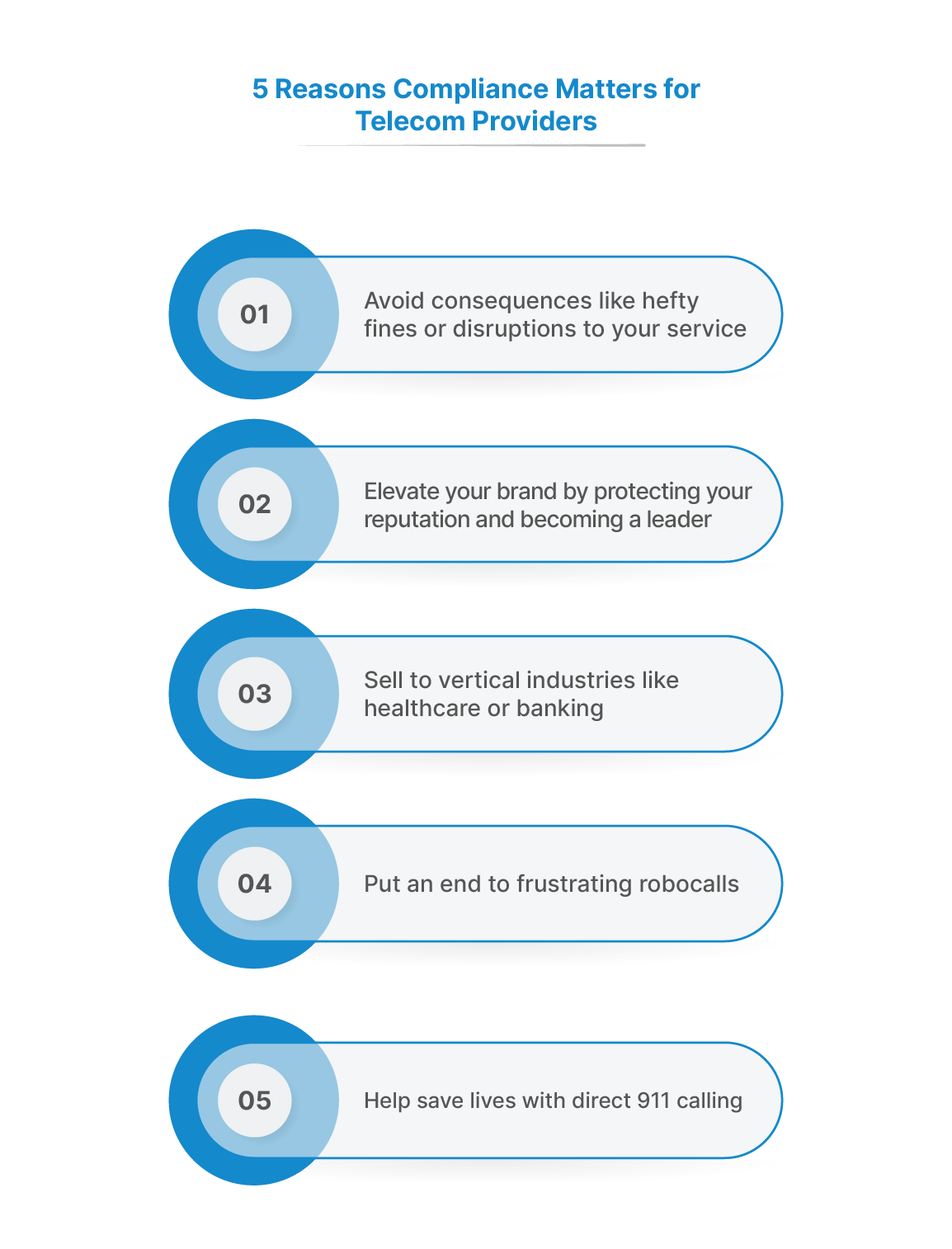The telecommunications industry in the United States is regulated by the Federal Communications Commission (FCC) to ensure ethical practices and fair competition.
Understanding all the different regulations can be overwhelming and confusing, so in this blog post we will break down a few of the major telecom regulations in the United States.
Why Compliance is Important for Telecom Vendors

Avoiding Consequences and Fines
One of the most obvious reasons to prioritize compliance with government regulations is to avoid the consequences of noncompliance. The FCC charges hefty fees to companies that are not in compliance which could be disastrous for a small or medium business.
For example, vendors that have not deployed the obligatory STIR/SHAKEN call authentication standards may be fined $23,727 for each call in violation of the law (source).
In addition to fees, your services could be paused or permanently turned off if you are found in compliance.
Going one step further, failure to comply with these regulations makes businesses vulnerable to lawsuits when things inevitably go awry. Even if you evade government notice of your noncompliance, your customers may be negatively affected and take action against you.
In short, compliance is the better option to protect your business from negative consequences.
Protecting Brand Reputation
In addition to avoiding negative consequences, compliance with regulatory laws is important to position your business as an ethical, responsible leader. Customers may inquire about your status related to different laws or regulations, and you should be prepared to answer.
Any negative consequences, like a disruption to your service, would be immediately obvious to your users. This would likely lead to losing customers and getting negative reviews.
Protect your reputation and establish your brand in a positive light in the industry by pursuing transparency and integrity in the area of regulatory compliance.
Reaching Vertical Industries
The communications industry is unique in that its reach extends into nearly every other industry. Afterall, most industries and verticals use communications to some extent. Regulation is important to hold telecom companies to the standards of each industry or market that they serve.
According to the Mercatus Center, a research center at George Mason University, the ten most regulated industries in the United States include, among others, the Credit Intermediation and Pharmaceutical and Medicine Manufacturing industries. Both of these industries rely heavily on communication to complete their business.
Taking a step back to look at a broader view, consider the banking industry as a whole. Communication is used for incoming calls, in which customers may inquire about sensitive information related to their accounts and finances, internal conferences or instant messages, and communication with third parties like investors or credit score companies. Each of these communications must be held to a high standard of privacy and protection.
And the banking industry is just one example. Telecommunications vendors touch so many industries, from healthcare to insurance to hospitality and more. Compliance is key to successfully sell to these vertical industries.
Learn more about selling to vertical industries in our ebook on Strategic Insights for 8 Vertical Industries.
2 Key Regulations for Telecom Vendors in the US
STIR/SHAKEN
We have probably all been victims of illegal robocalls. You see an incoming call from a familiar phone number, maybe even your own phone number, and answer only to hear a robotic voice talking about a recall on a car you do not even own or an alleged IRS audit.
Robocalls are frustrating and violating. In response to consumer complaints about these calls, the Federal Communications Commission (FCC) developed STIR/SHAKEN, a framework to increase call security and block unwanted calls.
STIR is an acronym for Secure Telephony Identity Revisited. It encompasses a set of technical standards that validate caller identity by assigning an encrypted certificate to each call. SHAKEN stands for Signature-based Handling of Asserted information using Tokens. This is a separate framework to support the implementation of STIR standards in voice service provider networks.
STIR/SHAKEN became a requirement for all large phone companies on June 30, 2021.
Learn more about STIR/SHAKEN and Bicom Systems’ role in supporting your compliance in these blog posts:
- STIR/SHAKEN and Bicom Systems: Everything You Need to Know
- How To Become STIR/SHAKEN Compliant with Bicom Systems
- 15 Most Frequent Questions About STIR/SHAKEN
Kari’s Law and Ray Baum Act
Multi-line telephone systems (MLTS) are a network of handsets and extensions in a business or organization, like an office building or a hotel. These systems often require a prefix or access code before dialing an external number. In an emergency where 911 must be called, not knowing the right prefix or access code would be (and has been) catastrophic.
Kari’s Law was created by the Federal Communications Commission (FCC) to require all MLTS manufacturers and vendors to enable direct dialing 911 without any prefix or access code. Furthermore, an automated notification must be sent to a central location, where someone is likely to see it, any time a 911 call has been made with a callback number and the location. Kari’s Law became a legal requirement on February 16, 2020.
Ray Baum’s Act focuses on providing an accurate location to dispatch authorities when a 911 call is placed. Section 506 of the Act requires communications vendors to ensure that all 911 calls will display an accurate location with a validated street address, regardless of the technology used to make the call. Ray Baum’s Act became a legal requirement on January 6, 2021.
These legislations are extremely important, going so far as to save lives. Learn more about Kari’s Law, the Ray Baum Act, and the role of Bicom Systems in our blog post: Kari’s Law and Ray Baum’s Act – An In-Depth Guide for Resellers.
Prioritizing Compliance For Your Business
Now that you know how important compliance is, what will you do next? While government regulations can be confusing and feel frustrating, we have now seen how they protect communication users, build up our reputations as vendors, and even save lives. There is simply no excuse not to comply.
If you are a Bicom Systems customer that wants support in prioritizing your approach to compliance, contact your Account Manager or Business Success Representative today. While we could never replace legal counsel, we would be happy to help you during this important part of your journey as a communications vendor.
If you are not already working with us, contact us to get started today with a vendor that focuses on not only making sales, but supporting our partners in all aspects of their business and journey to growth and success.

